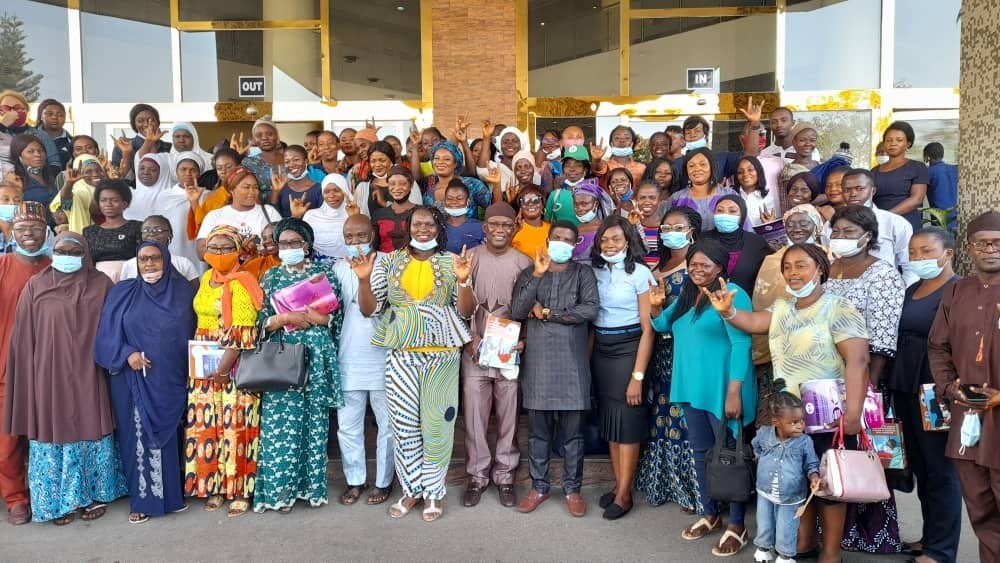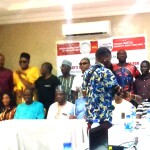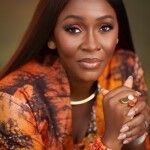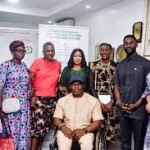As if it were not bad enough they lost their hearing; now at stake is their right to childbearing
By Olusegun Elijah
The framers of the National Reproductive Health (NRH) Policy launched in 2010 left out two things. Bola Olusola, pregnant with her first child in Ekiti about that period, didn’t hear of it. She couldn’t have. But she paid dearly for their recklessness.
The expectant mother and first timer registered at the state hospital in Ikere, and also a primary health centre (PHC) at Okeosun, close to her house. Should she slip into labour by night on her expected delivery date, she was covered. Attending antenatal clinic, too, would be easy—in caring hands.
Was it?
“During our antenatal meeting one day, one of the nurses pointed to me to lead a song. I tried to sing. Suddenly, all eyes were on me. Some were making jest of me,” she told ER in July.
But stigmatization eventually proved the least of her problems—the lowest barrier to the first and second values the NRH policy proposed. The Okeosun PHC—just like over 30,000 others of its kind across Nigeria—was supposed to implement the policy’s provisions at the grassroots level. And no fewer than 22 federal government secondary and tertiary hospitals were expected to do the same. Of major concern to women like Olusola was healthy pregnancy and childbearing through improving antenatal, delivery, postpartum and newborn care—among the policy’s four strategic priorities.
But all that was on paper.
“My experience during my pregnancy days remain ever green in my memory because it happens to be a bitter experience and if not for God I won't be alive today to tell my story,” she said. All along, in every maternity clinic she attended, she had no idea of what was going on. There are no fewer than nine million Nigerians like her, according to an unverifiable figure by an African Deaf Initiative official. And a good portion of the lot are women and girls, going by a WHO estimate.
“Though, I could lip-read but not all they were teaching I could comprehend,” she said.
Her ordeal was not unexpected.
First, the NRH policy lacks accessibility, for people with disabilities, in its formulation and implementation. And the Nigerian women with disabilities suffered the consequences of that oversight for eight years. A new PWD-tailored SRH policy crystalized later in 2018, after three years of formulation cycle in the federal ministry of health. It actually built on the earlier policy, and the likes of the National Reproductive Health/HIV Integration. Most importantly, the National Policy on Sexual and Reproductive Health and Rights of Women and Girls with Disabilities (NPSRHR WGWD) borrowed its thematic structure from the WHO Guideline Notes on Full Inclusion 2009. The policy cranks out 47 actions. They arise from five thematic areas, and aim to achieve two goals: improving access of women and girls with disabilities to SRH services; and protecting their rights to those services.
Beyond that, the 2018 policy offers nothing essentially far removed from the earlier caches of national policies. Disability policy critics have always insisted in interviews with ER that good disability management is not about new laws and policy frameworks.
The policy thematic areas relate mostly to education, access, partnership, review or monitoring, and research. Action No. 5 under Thematic Area 2 (improving access), for instance, calls for disability-specific sexual and reproductive health services. It could have benefitted women like Olusola. Except that it is not being specific enough. Many sweeping terms like that punctuate the policy.
However, the Discrimination Act 2018 eventually caters to some of the actions, in fairly concrete terms. It addresses specifically the second defect of the NRH policy and its later adaptation for women with disabilities.
Its Section 24 states: A public hospital where a person with communicational disabilities is medically attended to shall make provision for special communication.
Unfortunately, the health centre Olusola attended had none. Likewise the state’ hospital where she also registered.
Of all Nigerians that need special media of communication to access general health, the deaf remain one group among the most neglected, if not the most neglected. The Save the Deaf and Endangered Languages Initiative (S-DELI) Head of Projects Global Emma Asonye told ER this in August. “The deaf access to sexual and reproductive health service is not different from their access to general health services where special media of communication is absent,” he said.
His assertion essentially knocked the Act’s provision.
ER enquired at the Association of Sign Language Interpreters of Nigeria—to know the extent of their involvement in public health service delivery. The association’s National President Timothy Tinat, who received this and other questions, didn’t respond.
The question probably sounded too obvious. There’s no exact figure of sign language experts in Nigeria. “But in Lagos, we have 180 registered members,” said Makinde Tobi, a sign language expert and secretary of the state ASLIN. About 3 percent of them work in the health sector. That results in something he described as disgusting— what pregnant deaf women go through.

Sign Language Expert Tobi
Advocacy and rights groups have also found out something they equally describe in strong terms.
“The situation is totally disastrous for the deaf. It is unthinkable,” said Asonye. His organisation is the foremost promoter of indigenous sign languages in Nigeria and across Africa. So he had his fact about the communication problem.
Olusola wouldn’t doubt that. “I thought until a pregnant mother see blood as a sign of labour, she should not go to the hospital," she said. When her water broke continuously for three days, she padded up herself, and kept going to work.
At the point it became unbearable, she went back to hospital— on the sixth day of the sustained amniotic fluid bursts.
“Those nurses were angry with me, asking why didn't I come to the hospital and I told them I think only when I see blood before I could come.”
She eventually gave birth to a boy at midnight, six days after her water burst, and her expected delivery date long gone .
“The baby didn't cry,” she said, “and the nurses tried their best to wake him up.”
Up till the day of her delivery, all she bothered about while lip-reading was the delivery—just a part of the sexual and reproductive health services which the policy and the Discrimination Act proclaim and provide as rights. Others include healthy sexual development and sexuality; infection-free sex and reproduction; and achieving desired and intended fertility. All have remained inaccessible because of the language barrier in many government hospitals.
But 11 years ago, Adeola, another pregnant woman in Abeokuta, chose a private hospital for her first child. She didn’t rely on lip-reading alone here—like she would later do during her second pregnancy's antenatal clinic in a government hospital. The private hospital doctor would write his instruction down for her at times.
“Whenever he spoke, I watched his lips; if I didn't understand I would be asking him to write it. Or when he spoke, I repeated his statement to ensure I was not mistaken.”
This, however, cannot replace the use of sign language. That absence makes the private hospitals inaccessible to the deaf, too. And the government ministries—health, women affairs, youth and social development, and education—alongside departments, agencies and commissions (MDAs) have done little to remove or lower the barriers. Beyond its advocacy efforts for sign language adoption in school, the National Commission for People With Disabilities (NCPWD), for instance, seems to have consigned all the access and equality problems in hospitals to the Discrimination Act enforcement—or luck. Neither has worked so far.
The commission has yet to respond to questions about the Act provisions, including its Section 24, which the disability community have not enjoyed.
Asonye dismissed most of these disability MDAs. “We have discovered in our campaigns and advocacy they don’t know much about disability management,” he said. If the officials of such agencies have no loved ones who are deaf, he added, there won’t necessarily be a conscious action in policymaking to understand what deaf pregnant women face in hospitals—or anywhere. That is why a maternity nurse has no scruple telling a deaf woman to wait till other women leave—because the nurse has no time to spare for any kind of communication. “By law, people with disabilities are not supposed to queue,” Tobi said, “but the nurses insist pregnant deaf women have legs, at least—to join the queue.”
Olusola’s first baby eventually cried in the hands of the nurses. The experience made the mother of one register and attend her antenatal clinic at the state hospital for her second pregnancy.
But the barrier over there was no lower. Just as it wasn’t at the Ogun state hospital where her counterpart Adeola registered her second pregnancy. It was a little different at the Oyo general hospital where two other women (one frustrated earlier elsewhere) interviewed for the report they registered. They Oyo women said they got all the care they needed, though there was no sign language interpreter. But Adeola sat through her own antenatal clinic without anybody caring to know if she learnt anything. “I just sat down watching their lips,” she told ER.
During her delivery at the state hospital in Ekiti state, Olusola said the nurses simply left her with her husband in the labour room. They filed to the reception, and started chatting. She climbed down from the bed, and sprawled on the bare floor as the pang gripped her harder. Nobody she could tell how she felt—like urinating. So she ‘signed’ it to her hearing husband.
Asonye’s organization’s works in the deaf communities have documented the complexity of sign language problem across Nigeria. Hearing people teach deaf pupils in schools, and not many of the teachers trained in sign language interpretation. “Those trained work in urban areas,” he said.
There are five interpreters at the Lagos State University Teaching Hospital (LASUTH). “Other hospitals in Lagos have nothing,” Tobi said, confirming some, too, at the Gwagwalada General Hospital in the federal capital Abuja.
Olusola at Okeosun, for instance, likely stood no chance of getting a sign language interpreter at her rural antenatal clinic. If the public hospital she later ran to had been a federal one, with a Service Compact (SERVICOM) Unit that was disability-conscious, the highest she might have got was what Asonye called the school sign language. It is what most of the trained interpreters learn. It makes communicating difficult. The ideal, he said, is the native sign language—learnt naturally. But all she got was a staff of nurses who couldn’t endure a deaf woman in labour.
Following her sign, her husband discovered she wasn’t actually feeling like she earlier said. “He noticed that the baby’s head was already out,” she said. The nurses then rushed in. “I was bleeding seriously after I gave birth.”
For her jeopardy, the blame goes to the federal ministry of health. It has the leadership role in implementing the healthy pregnancy and safe childbearing goals of all the policies relating to SRH rights and services. To make its work even easier, the ministry has a number of agencies and departments at its beck and call. At its Abuja headquarters is a SERVICOM unit which claims to promote effective and efficient service delivery in all government hospitals.
The unit ideally should be aware of how the deaf women in government hospital labour rooms get the short end of the stick. ER sought clarification on the quality of services these women get in hospitals, especially with the absence of sign language service; and the plan, if any, the health ministry with SERVICOM has put in place in about 19 years to make access to health service easy for WWDs. The unit didn’t respond to the text and the email sent as of the time of publishing this report. Neither is there any documentation or report the ministry and its unit have to that effect. All of that silence speaks of one thing: policy failure. The behavioral change programme, the transportation to hospitals, the media campaigns for SRHR of PWDs, the accessible communication media and formats—some points among the many the policy raises—have not been actioned five years after.
Followed to the letter, the policy ought to be self-correcting. The framework, under Thematic Area 2, calls for a periodic audit. The CSOs working the disability beat, the organisations of people with disabilities (OPDs), and other accountability groups have that responsibility.
But these watchdogs have their problem. The policy framers point out how the groups work in isolation, at variance with the government, and even the OPDs. It all stems from the enterprise conception of ownership of the fight for SRH rights of the vulnerable women.
ER found out many of the leaders of the OPDs are equally founders and executives of disability NGOs spearheading solo campaigns, including SRH rights.
“While it makes sense to allude to the fact that PWDs should lead advocacy and sensitization efforts to better their lot, it is important to counsel that such programs can only succeed with strong partnerships and collaborations with major stakeholders,” the NPSRHR states in its fourth thematic area.
Most of the NGOs, including Deaf Women Aloud Initiative (DWAI) whose founder Helen Beyioku-Alase doubles as the chairman of the Deaf Women Association of Nigeria, ignored ER requests for clarifications. Her organisation has, however, produced a series of policy-worthy documents in its advocacy. One of them is the Deaf Inclusive Sexual Health (DISH). Asonye’s S-DELI has also proposed its Deaf People Linguistic Rights. Both works centre the language barrier that confronts the deaf in Nigeria, one specifically targeting access for women like Olusola and Adeola.
The two women, in terms of abstracting from experience, are no policy wonks. But they could articulate the thing they went through in the lead-up to their one-night travail in those two labour rooms. It was what the SRH policymakers spent three years and 40 pages figuring out: “… A fraction of the Nigerian society (which includes some learned health experts) have subconsciously placed and treated PWDS as ‘things without sexual reproductive organs’; ‘incapable’ or ‘not expected or supposed’ to engage in sexual activities.”
When society changes this attitude, millions of pregnant deaf women will need no sign language to feel the difference. They’ll see for themselves the huge enterprise of endless policymaking and advocacy winding down, and concrete actions for more inclusion gearing up.







